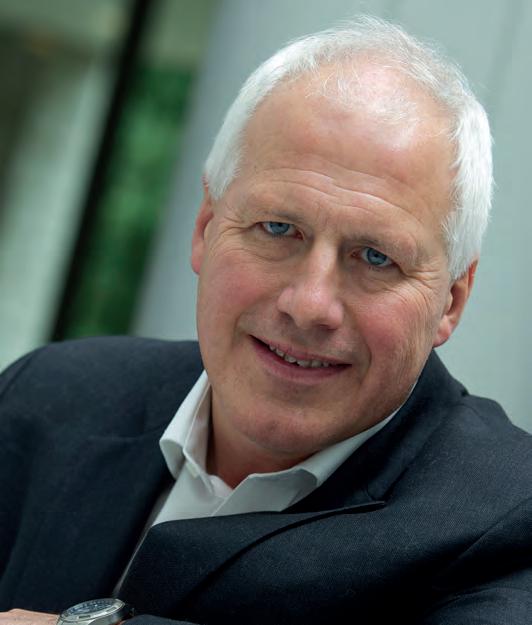
2 minute read
As I see it
Andy Richards (Jesus 1978) has been involved in some 30 companies as founder, adviser, mentor, investor, board member or chair, and was an early-stage investor in Chemistry spin-out PharmEnable. Andy’s current projects range across healthcare, therapeutics, digital health, data, genomics AI and mental health.
It’s all about themes, teams and timing.
The theme I am particularly interested in at the moment is big data and where that meets what I would describe as ‘artisanal science’ – by which I mean a mixture of deep knowledge and creativity.
A good team is essential. It should have not only the right skill set, but also the right chemistry – including chemistry between the people! Ideas without people just won’t succeed.
Timing is something I’ve come to learn over the years. If you get the timing right, there’s a better impact, which in my experience aligns with nancial and business success. There are lots of things I’ve been involved with where we were too early. That can be intellectually satisfying (thinking ‘we were right all along!’) but otherwise somebody else gets all the glory later on. PharmEnable is a good example – its development of an arti cial Intelligence and machine learning platform for drug discovery is a hot theme. The concept of adding AI approaches also satis es the move toward much better validation of drug discovery targets. The team had experience working in real companies and covered a good mix of real chemistry and ‘people’ chemistry. I knew the timing was right because people started talking to me about it and asking questions – there was a real buzz.
Cambridge is a good environment for commercialising research. Cambridge Enterprise and the Judge Business School run many courses and workshops for anybody, from students to academics. Schemes like the business plan competition o er training on how to write a business plan, and winners get access to accelerators, experts and even funding. The CE team o er an abundance of resources and support, and interact well with the Angel network.
Accelerators are a good place to help develop an initial idea. There are accelerators for all stages – one of the Babraham accelerators (Startup@Babraham) supports concepts before they even become companies, and the Wellcome Genome Campus has a great start-up community for ideas in the genome space. KQ Labs, where I met the Pharmenable team, is an accelerator programme based at the Crick Institute in London and is speci cally for ideas at the interface of data and life sciences.
It’s never too early to start thinking about commercialising a good idea. It’s good to get yourself orientated and thinking about what you want to do.
I like to invest early – I suspect that is not economically the best time – but it is the most interesting.
Pro ts in these sorts of science and R & D areas are usually a very long way down the track. If you engage with accelerators, mentors and other schemes, you’ll get a sense of whether your idea is hitting home or not. But at some stage you need to know when to say ‘this isn’t really working’ or understand what you need to do to make it happen.










